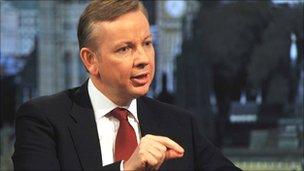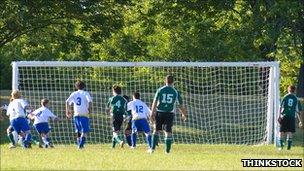Michael Gove defends school sports funding change
- Published

The education secretary insisted headteachers will get more power
Scrapping the school sports budget will not reduce participation, Education Secretary Michael Gove has insisted.
The £162m will no longer be set aside for a national PE scheme. Headteachers in England will instead decide how much of their budget to allocate to sport.
Mr Gove told BBC One's Andrew Marr Show a new school 'Olympics' would be more effective at increasing participation.
His Labour counterpart Andy Burnham accused him of jeopardising a decade of improvement in school sports.
And leaders of some of the 450 local School Sports Partnerships (SSPs), which face an uncertain future as a result of the removal of ring-fencing, had accused ministers of risking a cut in the amount of competition pupils take part in.
But Mr Gove said that despite £2.4bn of investment over seven years, just one child in five played competitive sport against another school.
"One of the problems with the existing system that we have had is that we haven't seen the increase in the number of people playing competitive sport," he said.
'Team sport revival'
"My cabinet colleague [Culture Secretary] Jeremy Hunt has got a marvellous proposal for a school Olympics, meaning that in every community every year we will have competitive sport.
"Unlike the situation we have at the moment where the number of people playing rugby, hockey and football has either flat-lined, or gone down in some cases, we'll have a revival of team sports."
Mr Gove insisted that despite the cut, school funding would go up overall - through a £2.5bn "pupil premium" targeting schools with poorer children and £1.1bn to help schools cope with growing pupil numbers.
SSPs employ co-ordinators to improve competition within and between schools and improve pupils' access to sports, including after class.
When he announced he was scrapping the sport budget in October, Mr Gove said the SSP network was "neither affordable nor likely to be the best way to help schools achieve their potential in improving competitive sport".
But Alison Hope, partnership development manager for Cambridge SSP, was among those to hit back, saying removing SSP structure and funding created "a real risk of lessening the amount of competitions taking place".
Supporters credit targeted funding with increasing the number of youngsters playing at least two hours of sport at school from almost two million in 2004 to more than six and a half million in 2010.
Shadow education secretary Mr Burnham told Sky News: "I remember the 1980s when school sports dried up and when I worked in government I was on a mission to rebuild it and that's what we've done in the last 10 years.
"We need this investment in school sport because it helps build more rounded children. It helps drive up standards in schools but crucially it makes them healthier too."
Mr Burnham said Labour would have accepted a 30% cut in the funding but that removing it altogether "flew in the face" of the commitment to a lasting sports legacy from the 2012 London Olympics.

Mr Gove says team sport participation has "flat-lined", although opponents disagree
Removing ring-fencing for particular activities, such as sport, is part of the government's plan to give headteachers more control over spending.
Mr Gove told Andrew Marr any suggestion schools would still be forced to do what ministers wanted them to was a "fundamental misconception".
He accepted he wanted a more traditional curriculum, with more emphasis on grammar and spelling but said teachers would get more powers over how to teach, spend money and discipline.
Mr Gove also denied councils would lose their role in distributing schools funding, adding that suggestions it would be distributed centrally were "not true".
The education secretary said he would be setting out plans in a White Paper this week to make GCSEs more rigorous by placing more emphasis on exams at the end of courses, rather than during bite-sized modules.
He has already announced similar plans for A-levels.
- Published13 November 2010